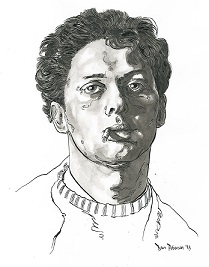Do not go gentle into that good night

Dylan Thomas
Do not go gentle into that good
night,
Old age should burn and rave at close of day;
Rage,
rage against the dying of the light.
Though wise men at
their end know dark is right,
Because their words had forked
no lightning they
Do not go gentle into that good
night.
Good men, the last wave by, crying how
bright
Their frail deeds might have danced in a green
bay,
Rage, rage against the dying of the light.
Wild
men who caught and sang the sun in flight,
And learn, too
late, they grieved it on its way,
Do not go gentle into that
good night.
Grave men, near death, who see with blinding
sight
Blind eyes could blaze like meteors and be gay,
Rage,
rage against the dying of the light.
And you, my father,
there on the sad height,
Curse, bless, me now with your
fierce tears, I pray.
Do not go gentle into that good
night.
Rage, rage against the dying of the light.
Dylan Thomas (27 October 1914 – 9 November 1953) was a Welsh poet and writer whose works include the poems "Do not go gentle into that good night" and "And death shall have no dominion", the "Play for Voices", Under Milk Wood, and stories and radio broadcasts such as A Child's Christmas in Wales and Portrait of the Artist as a Young Dog. He became popular in his lifetime and remained so after his premature death in New York City. In his later life he acquired a reputation, which he encouraged, as a "roistering, drunken and doomed poet"
Home
